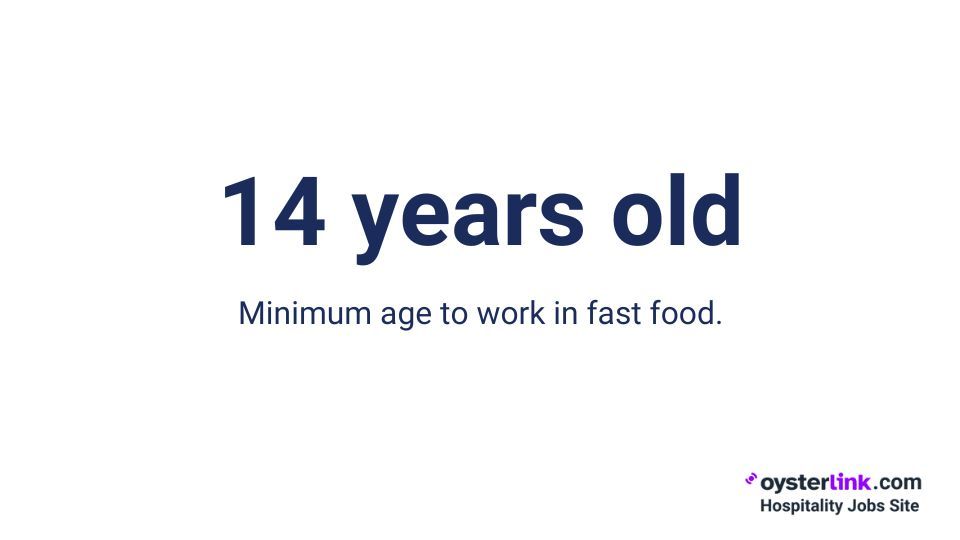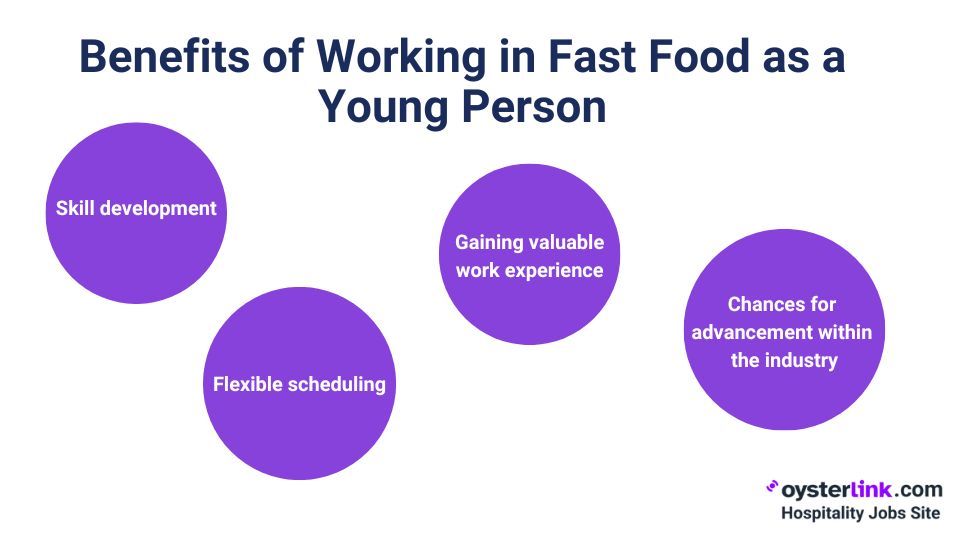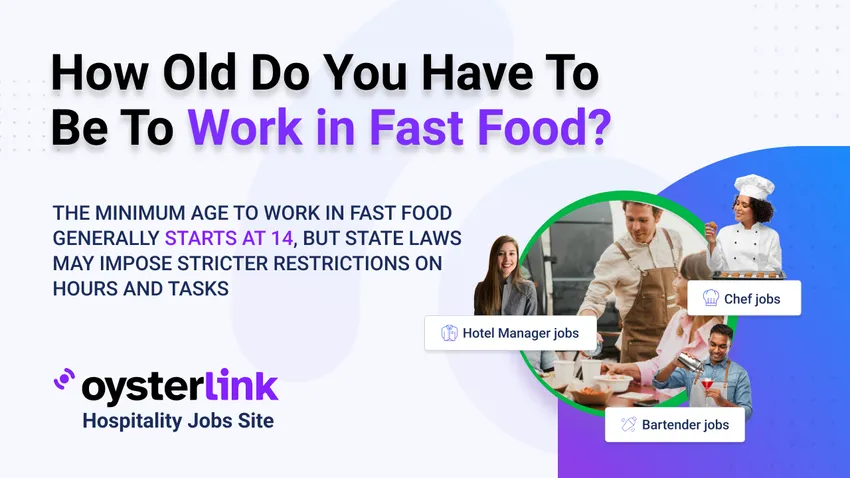A common question among young people looking to get their first job is often: how old do you have to be to work in fast food?
This article aims to provide insights into the age restrictions for fast food employment across the United States.
How Old Do You Have To Be To Work in Fast Food?
In the U.S., the Fair Labor Standards Act (FLSA) establishes the basic age requirements for young workers.
Generally, the minimum age to work in fast food is 14 years old, but there are specific restrictions regarding the hours that younger workers can log and the types of tasks they are allowed to perform.

It is essential to be aware that states may also have their own labor laws that can be stricter than federal guidelines.
For instance, roles that involve operating heavy machinery or cooking equipment usually require employees to be at least 16 years old.
Fast-Food Worker Age Requirements by State
The age requirements to work in fast food can vary significantly based on state laws.
While many states comply with federal guidelines, some have enacted stricter regulations to protect younger workers.
Understanding these differences can provide you with valuable insights into your job prospects.
Some states have laws that set the minimum working age at 15 or 16, particularly for specific tasks, ensuring added protection for younger workers.
The table below provides a comprehensive overview of the age requirements to work in fast food by state.
State | Minimum Age to Work in Fast Food | Notes |
Alabama | 14 | Limited hours for those under 16. |
Alaska | 14 | May work limited hours; 16 for hazardous jobs. |
Arizona | 16 | Must have a work permit for those under 18. |
Arkansas | 14 | Restrictions on hours for those under 16. |
California | 14 | Requires work permit; some restrictions for under 16. |
Colorado | 14 | Specific restrictions on tasks assigned to those under 16. |
Connecticut | 15 | Can work in food service; restricted hours for under 16. |
Delaware | 14 | Limited hours; work permit required for those under 18. |
Florida | 14 | Limited hours for younger workers; specific restrictions apply. |
Georgia | 14 | Limited hours; parents must sign work permits for minors. |
Hawaii | 14 | Can work in food service; additional restrictions for under 16. |
Idaho | 14 | Restrictions on hours and duties for younger workers. |
Illinois | 14 | Work permit required; under 16 limited to certain tasks. |
Indiana | 14 | Limited work hours for minors; parental consent required. |
Iowa | 14 | Limited hours for those under 16; compliance with state law. |
Kansas | 14 | Restrictions on duties for minors; work permits necessary. |
Kentucky | 14 | Limited hours; must adhere to restrictions for those under 16. |
Louisiana | 14 | Work permits required; specific restrictions apply. |
Maine | 14 | Limitations on hours and duties for those under 16. |
Maryland | 15 | Some restrictions for those under 16; work permits necessary. |
Massachusetts | 14 | Limited hours; stringent regulations for minor workers. |
Michigan | 14 | Limited hours; additional restrictions may apply. |
Minnesota | 14 | Restrictions on hours and job duties for minors. |
Mississippi | 14 | Limited hours; parental consent required for those under 18. |
Missouri | 14 | Limited working hours for minors; specific tasks restricted. |
Montana | 14 | Restrictions vary for farm and food service jobs. |
Nebraska | 14 | Limited hours; work permits required for under 18. |
Nevada | 14 | Some restrictions for job tasks; requires work permit. |
New Hampshire | 14 | Limited hours for those under 16; specific task restrictions. |
New Jersey | 14 | Work permit required; restricted hours for younger workers. |
New Mexico | 15 | Must adhere to restrictions for job types and hours. |
New York | 14 | Work permit required; restrictions on tasks for younger workers. |
North Carolina | 15 | Limited hours; some restrictions apply to younger employees. |
North Dakota | 14 | Limited working hours and duties for minors. |
Ohio | 14 | Must have a work permit; restrictions based on age. |
Oklahoma | 15 | Work permit required; few restrictions on tasks. |
Oregon | 14 | Restricted hours for under 16; must obtain work permit. |
Pennsylvania | 14 | Limited hours; strict regulations for minors. |
Rhode Island | 14 | Work permits required; specific task limitations. |
South Carolina | 14 | Limited working hours for minors; specific restrictions apply. |
South Dakota | 14 | Restrictions apply; work permits required. |
Tennessee | 14 | Limited hours and duties for those under 16. |
Texas | 14 | Limited hours; specific types of work for younger workers. |
Utah | 14 | Work permits required; strict regulations for minors. |
Vermont | 14 | Limited working hours and job duties for minors. |
Virginia | 14 | Requires work permit; limited hours for younger workers. |
Washington | 14 | Limited hours for those under 16; certain tasks restricted. |
West Virginia | 14 | Restricted hours and tasks for minors; work permits required. |
Wisconsin | 14 | Limited hours for those under 16; specific tasks may be restricted. |
Wyoming | 14 | Restrictions on hours and duties for those under 16. |
As you plan to apply for a fast food job, it is important to check your local labor laws to ensure you meet all necessary age requirements before submitting applications.
Job Options in Fast Food for Different Age Groups
When considering a fast food job, it is crucial to know what your options are based on your age.
Different age groups can take on varying responsibilities and hours, which can affect your overall work experience.
Ages 14–15
If you are between 14 and 15 years old, you can expect to find job opportunities with certain restrictions.
Young workers in this age bracket are typically limited to working no more than three hours on school days and eight hours on non-school days.
Common positions in fast food include:
- Cashier: Responsible for handling customer transactions.
- Lobby Attendant: Tasked with maintaining cleanliness and ensuring a welcoming environment.
- Food Preparer: Assists in basic food preparation tasks while avoiding hazardous equipment.
Ages 16–17
Upon turning 16 or 17, the opportunities expand significantly. At this age, you will have increased flexibility in your hours, allowing you to manage your school and work commitments more effectively.
A position that becomes available to you is Cook, where you will be responsible for preparing food and managing kitchen operations.
Another option is Shift Leader, where you will support managers in overseeing shifts and mentoring team members.
Age 18 and above
Once you turn 18, the employment landscape opens up entirely. You will be able to take on virtually any role within fast food establishments, including critical management positions.
Additionally, with greater responsibilities come increased pay and opportunities for tips, which can make your work financially rewarding.
See also: Places That Hire at 16 in the Restaurant Industry
Understanding the Fast-Food Job Application Process
As you consider applying for a job in fast food, knowing how to navigate the application process can boost your chances of landing your first role.
Start by creating a resume that highlights your skills, interests and any previous volunteer work.
Even if it is your first job, emphasizing your strengths and demonstrating why you would be a great fit can make a strong impression.
If you are under 18, be prepared to obtain parental consent, as many fast food chains require this documentation from younger applicants.
Additionally, practice for common interview questions you might face, such as why you want to work there, what experience you have with teamwork and how you handle stressful situations.
Keep in mind that dressing appropriately for the interview can also leave a good impression on potential employers.
Benefits of Working in Fast Food as a Young Person
Working at a fast-food establishment can provide numerous lifelong skills and experiences that will serve you well in your future endeavors.
One of the most significant advantages is the opportunity for skill development. You will gain valuable customer service skills, improve your communication abilities and learn to work as part of a team.
These foundational skills are useful in various careers, not just in the fast food industry.
Moreover, many fast food jobs offer flexible scheduling, which makes it easier to balance work with school and other commitments.
This flexibility is ideal for young workers navigating the pressures of education while gaining valuable work experience.
Additionally, there are often chances for advancement within the fast food industry, with many workers moving up to managerial positions over time.

See also: Pros and Cons of Being a Fast Food Worker
Starting Your Fast-Food Career With OysterLink
Working in fast food can be a great first job for young people. The minimum age requirement is generally 14 years old, although this can vary depending on where you live and the specific role.
As you start your job search, consider using resources like OysterLink to help you connect with potential employers and make the application process smoother.











Loading comments...